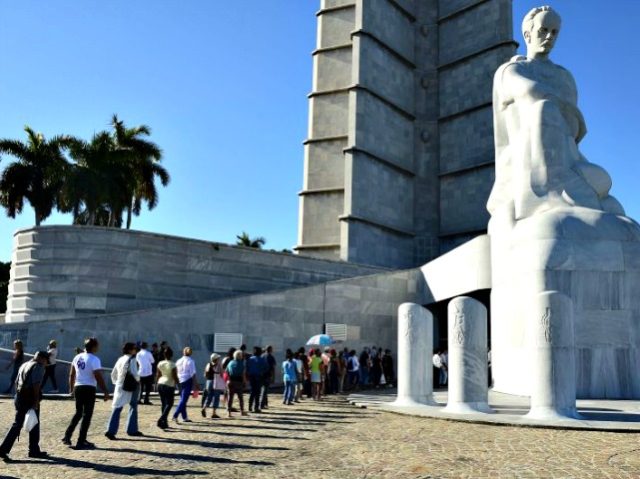The repressive Cuban government urged its people to reaffirm their belief in a communist, single party system as they bid farewell to Fidel Castro by signing an oath of loyalty to the dictator’s ideology.
“Cubans went to local government offices to sign an oath pledging loyalty to the Revolution, and specifically to a definition of it that Castro laid out in a 2000 speech,” reports the Washington Post (WaPo).
“Castro defined it then as a broad, evolving system of values: equality and freedom, modesty and altruism, truth, honesty and justice,” it adds. “Whether Cubans believe his communist-run state has achieved those things was another matter.”
According to the Martí news outlet, Cuban authorities set up more than 1,000 funeral tribute sites across the country where people signed the pledge to remain loyal to Castro’s socialist ideology.
“Lines stretched for hours outside the Plaza of the Revolution, the massive plaza where Castro delivered fiery speeches to hundreds of thousands of supporters in the years after he seized power,” reports the Associated Press (AP).
“There and across the country, people signed condolence books and an oath of loyalty to Castro’s sweeping May 1, 2000, proclamation of the Cuban revolution as an unending battle for socialism, nationalism and an outsize role for the island on the world stage,” it adds.
Although the WaPo reports that signing the loyalty oath was “voluntary,” it is doubtful Cubans had much of a choice but to sign.
“Virtually any Cuban with ties to a government school, ministry or state-run business would be expected to make the trip” to sign the oath, acknowledges the Post, adding, “There was little doubt the event was meant to convey an impression of mass popular support for Castro, who was never directly elected.”
“Many mourners came on their own, but thousands of others were sent in groups by the communist government, which still employs about 80 percent of the working people in Cuba despite the growth of the private sector under Castro’s successor, his brother Raul,” notes AP.
In Cuba, the arrest of dissidents has intensified since December 2014, when U.S. President Barack Obama and Cuban President Raúl Castro announced the beginning of a process to normalize the relationship between their two countries.
There were more than 8,616 documented political arrests in Cuba in 2015 alone, notes Mike Gonzalez from the Heritage Foundation, citing the Cuban Committee for Human Rights and National Reconciliation.
The political arrests this year are on pace to surpass those that occurred in 2015, he also writes, adding that there had been more than 8,505 during the first eight months of 2016.
“This represents the highest rate of political arrests in decades and nearly quadruples the tally of political arrests throughout all of 2010 (2,074), early in Obama’s presidency,” declares Gonzalez.
Castro left behind a dark legacy: a repressive system that punished nearly all forms of dissent.
“Out of loyalty, obligation, or perhaps a bit of both, Cubans lined up for hours Monday to pay respects to Castro in a hushed procession that was tightly choreographed by their government,” points out WaPo.

COMMENTS
Please let us know if you're having issues with commenting.